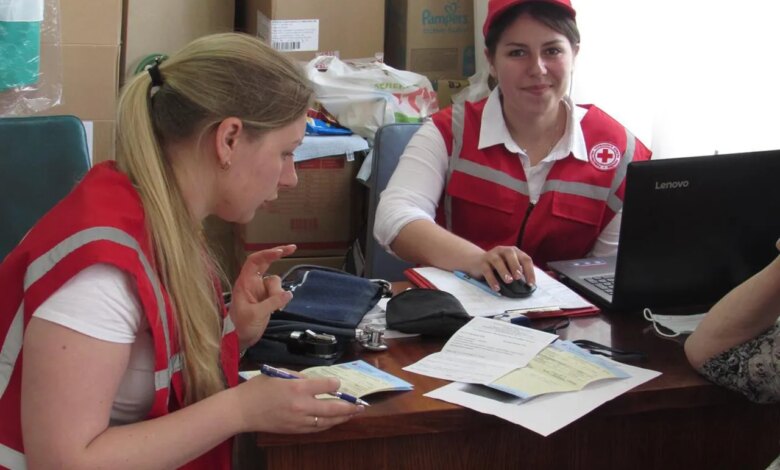‘A little help’: The Canadian Red Cross funds medical clinics for displaced people in Ukraine

KORSUN-SHEVCHENKIVSKYI – Medical intern Alina Manko sits at a desk and talks to a woman while other patients wait their turn.
Wearing a red vest and a cap, Manko is part of a group of workers from mobile units funded by the Canadian Red Cross that provide health care in central Ukraine for thousands of civilians displaced by the war with Russia.
“It’s part of my job to help people when they’re broken,” Manko says in faltering English from the makeshift clinic at a community center in Korsun-Shevchenkivskyi, two hours south of Kiev.
The clinic moves to a different community every few days, settling in different buildings.
It’s always busy, adds Manko. Most patients seeking help are the elderly or young children.
“It is a very important task for us and our team helps these old people every day. We try to help with their problems, give them medicines.”
Dozens of boxes of clothing and medical supplies are piled up in rows at the entrance to the clinic.
Three retired seniors wait outside on a bench for a chance to see the doctor or a nurse. They speak to The Canadian Press through an interpreter.
The women showed up the day before, they say, but it was busy and they were asked to come back the next morning.
Tamara Romanova says her knee is bothering her.
“I go to the regular clinics, but they can’t solve my problems, so I tried to figure out how to solve it with the help of the Red Cross,” she says.
Most of the mobile units have taken up residence in the Cherkasy Oblast region, a relatively safe area where about 300,000 Ukrainians have taken refuge. They have rented apartments, moved in with other families or settled in community centers.
Some fled heavy fighting in areas such as Donbas and Kharkiv.
Lovov Momot says it is quiet in Korsun-Shevchenkivskyi, but it is not at home and there is not enough help.
“I have been living in Korsun for more than two years. There is no regular help here. There was no humanitarian aid for five months,” she says as she waits for the doctor.
“Everyone wants to go home.”
Mathieu Leonard, program manager for the Canadian Red Cross in Ukraine, says the country’s healthcare system is under strain.
“The health system has been severely affected by reduced resources and the people who are displaced also have no access to this care,” he says.
Central Ukraine has become a beacon for those fleeing war, says Leonard.
“First, it is safety. There are relatively fewer attacks in this region.
“It’s also relatively closer to their provinces of origin…also economically, the cost of living is a bit lower than in places like Kyiv or other big cities.”
The Canadian Red Cross is also helping to refurbish some of the community centers used to house the displaced, Leonard says, by making sure the buildings have good plumbing and heating.
A former student house in Korsun-Shevchenkivskyi, which has now become a community center, is getting a fresh coat of paint, new furniture and bathrooms. It is home to 98 people, mostly women and children, with desks on each floor for children to continue their education.
Leonard says mental health services are also provided.
“One of the things we’re seeing more of is the mental distress that starts to pile up over time,” he says.
“You have young people who suddenly got hurt and their lives have changed after amputations and things like this. It’s a difficult situation, so we’re trying to help them at least a little bit.”
Yulia Holodna, head of the Cherkasy branch of the Ukrainian Red Cross, says that each floor in the community center is suitable for children of different ages.
“We are going to create a special study place for those children. And we will have a lot of activities here, different types of psychologists and different types of social workers will work with them,” she says.
Leonard says the work can be heartbreaking.
“It’s never easy. It’s hard, but I admire the people,” he says.
“They are very strong. They are very resilient and really try their best to contribute.”
This report from The Canadian Press was first published on June 19, 2023.




